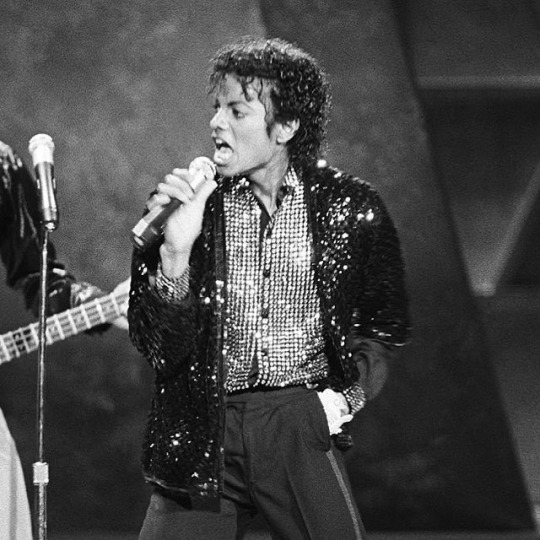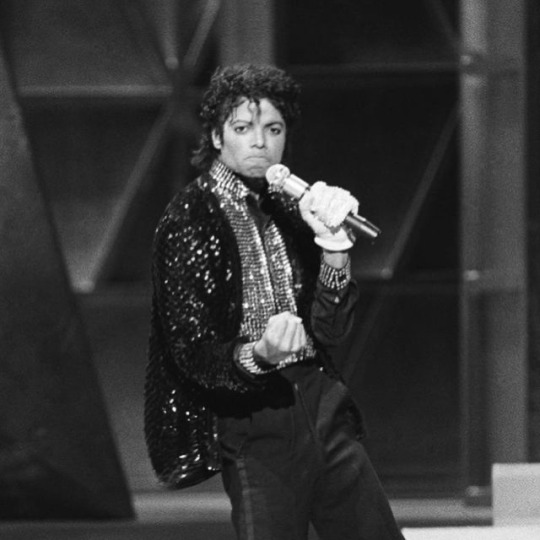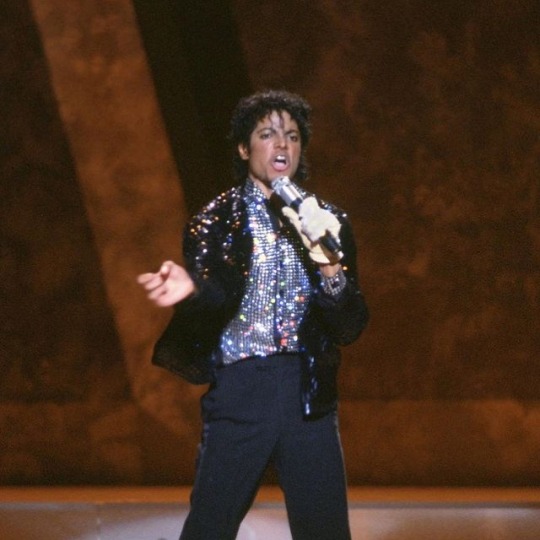#motown 25
Text
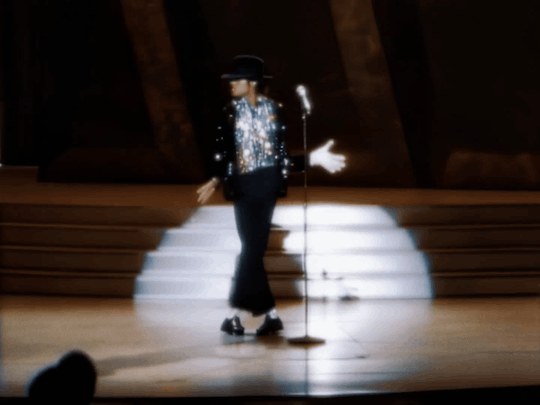


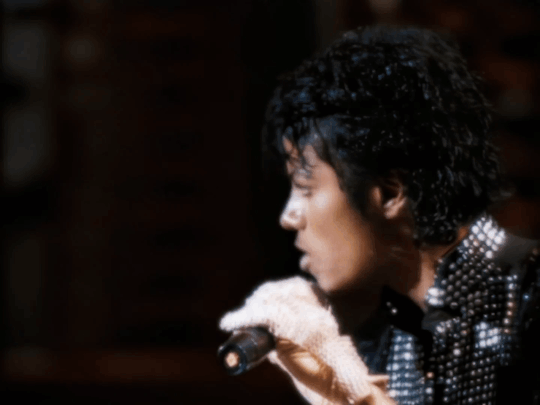
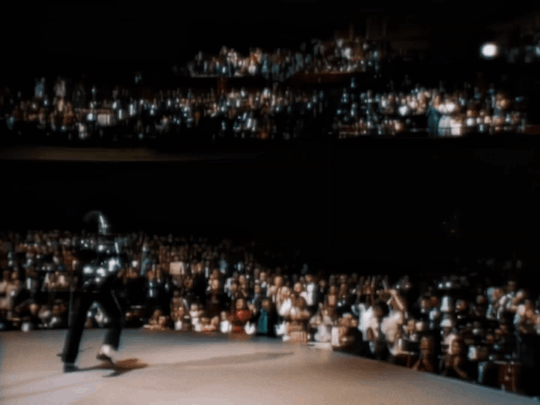
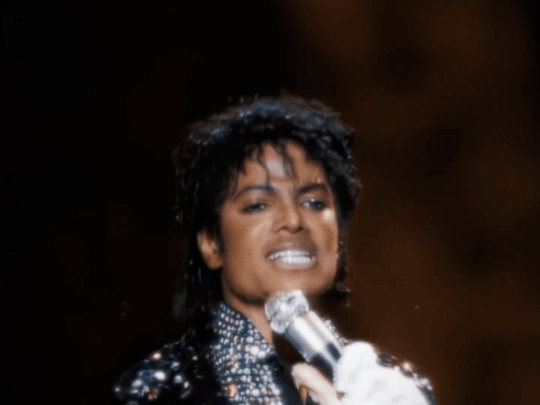
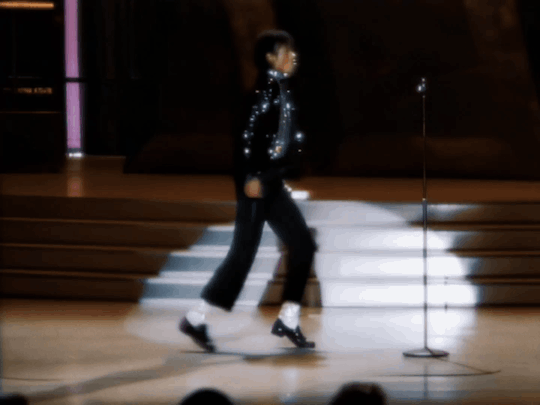
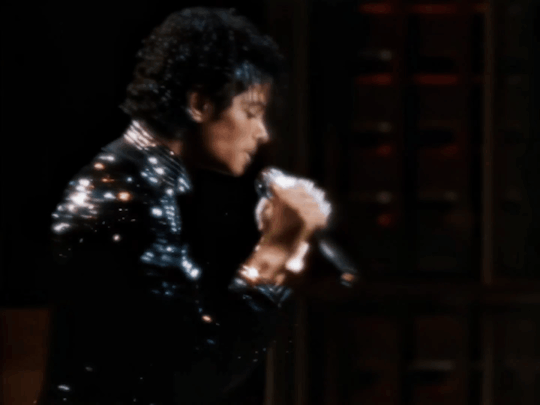
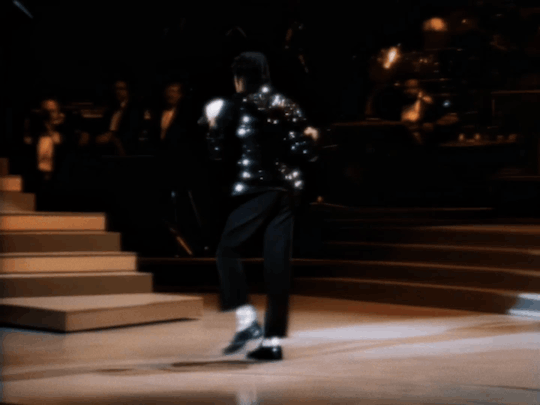
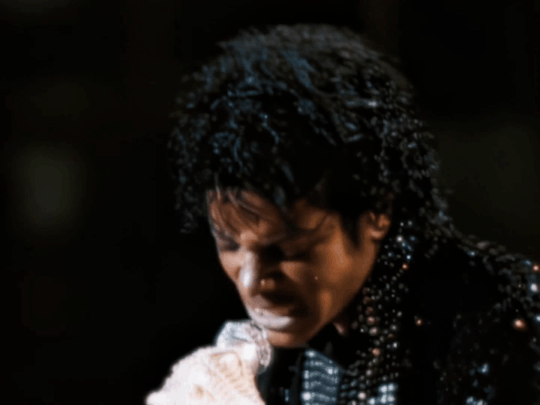
ᴍɪᴄʜᴀᴇʟ ᴊᴀᴄᴋꜱᴏɴ ᴅᴇʙᴜᴛᴇᴅ ᴛʜᴇ ᴍᴏᴏɴᴡᴀʟᴋ ᴀᴛ ᴍᴏᴛᴏᴡɴ 25ᴛʜ ᴀɴɴɪᴠᴇʀꜱᴀʀʏ ɪɴ 1983
#michael jackson#mj#king of pop#80s#80s music#black musicians#melanin#motown#motown 25#billie jean#thriller#thriller era#michaeljacksonedit#my post#userzonez#usermusic#usermusicdaily#useroptional#dailymusicians#popularcultures#popularcultersource#pocedit#pocsource
232 notes
·
View notes
Text

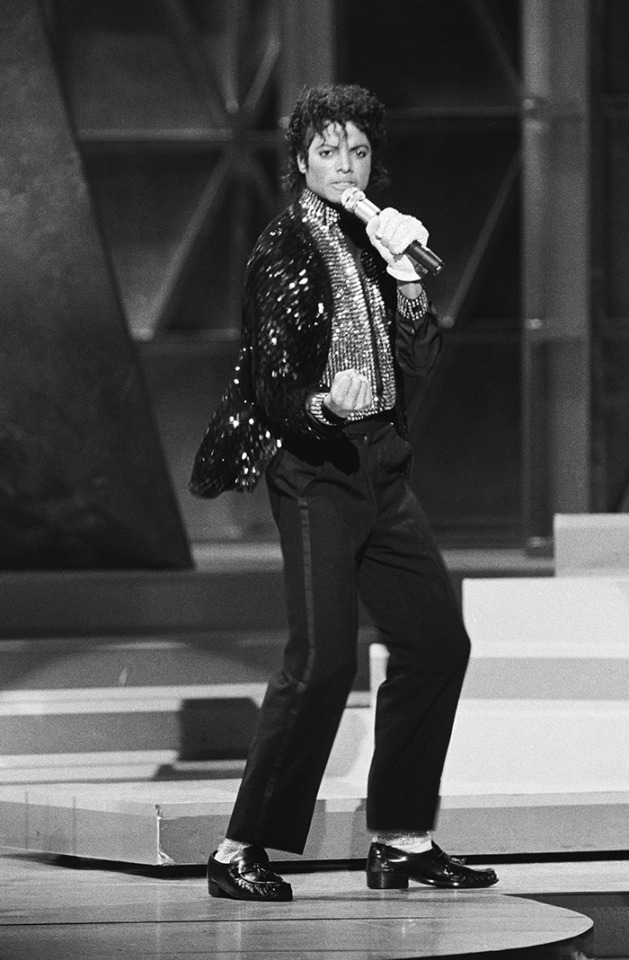
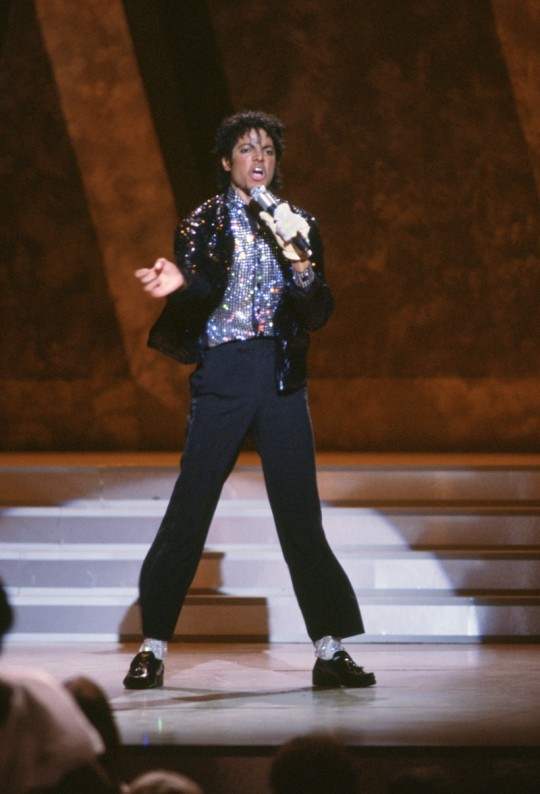
Iconic imagery from my childhood. I remember watching this on TV. It was the special for the 25th anniversary of Motown. We watched the whole show, but I only remember this performance of Billie Jean, and this dance. It was incredible.
In retrospect, looking at this today, his shirt/jacket combo wouldn't be out of place on Dorothy from The Golden Girls, at a black tie event. Just stuff some shoulder pads in there, and voila! Sparkly little clutch and a floor length black skirt, and she's good to go.
9 notes
·
View notes
Text
40 years ago today and no one, in my opinion, has looked this cool on stage since. I mean, yes, there are a trillion examples but knowing his story, artistically, STILL inspires me so much.
12 notes
·
View notes
Photo
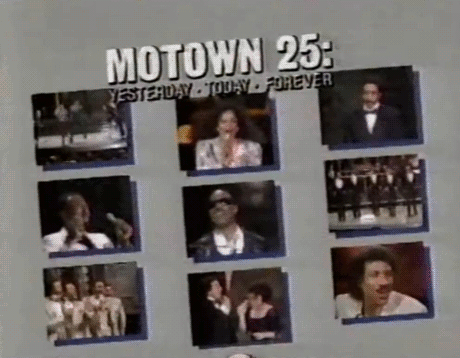
45 notes
·
View notes
Text
instagram
msblinkbeats We are the pulse of the world but The World isn’t exclusively U.S. music. Let’s explore some Black-owned labels around the globe
🌎 🌍 🌏
SIDE NOTE: Instagram is trippin’ off the hashtag/creative works of @naimagram + @musicsermon so I’m not the only one potentially having issues sharing content. Click the hashtags to learn as much as you can about our contributions and be patient as people all. Over. SOCIAL MEDIA. share what we love about Us™️
She’s done a major thing. Props to her. 🙏🏾
#blackmusicmonth #blackmusicmonthchallenge #musicsermon
Shout out to Motown records

#Instagram#Spotify#blackmusicmonth#blackmusicmonthchallenge#musicsermon#Shout out to Motown records#Motown#sunday night slow jams#funk#groove#rnb#motown beat#motown 25#quiet storm#motown records
2 notes
·
View notes
Text
michael jackson billie jean live first time moonwalk
youtube
80's Fest Event of the day: Michael Jackson debuts the Moonwalk at the Motown 25: Yesterday, Today, Forever special. #history #michaeljackson #moonwalk #billiejean #Motown25 #80s #80sfest #durandurantulsas5thannual80sfest
#history#rip michael jackson#michael jackson#Moonwalk#motown 25#80s fest#80s#duran duran tulsa's 5th annual 80s fest#Youtube#Spotify
0 notes
Video
youtube
The Jackson 5 & Michael Jackson - Motown 25 Performance (Remastered)
1 note
·
View note
Text
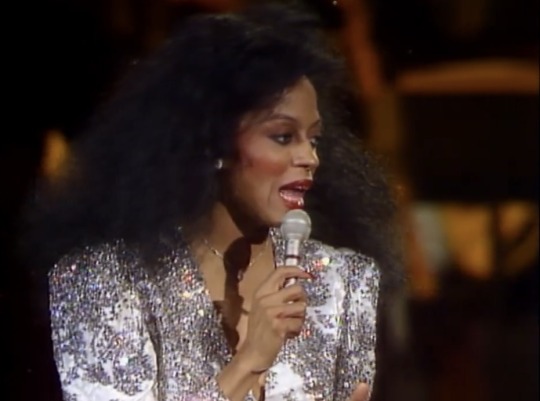
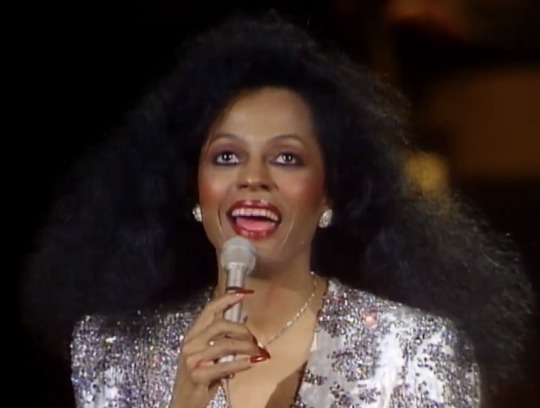

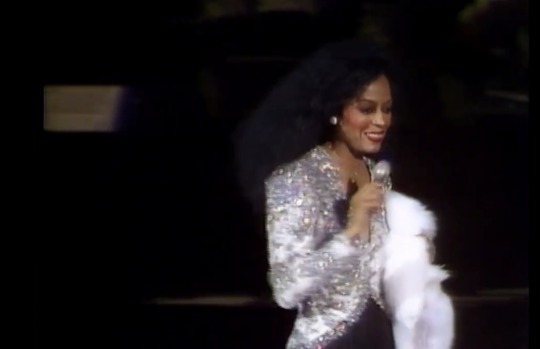
Diana Ross’ medley at the “Motown 25 TV Special” (1983)
#fashion#vintage#like#style#inspo#dianaross#icon#pop music#pop culture#pop#music#motown#thesupremes#iconic#legendary#fashion magazine#vintage fashion#80’s aesthetic#aesthetic#80s women#60s women#beautiful women#beauty#glamour
24 notes
·
View notes
Text
Year-End Poll #34: 1983
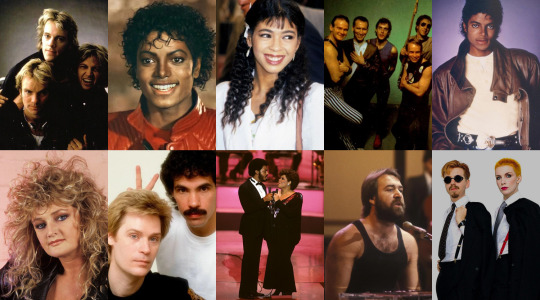
[Image description: a collage of photos of the 10 musicians and musical groups featured in this poll. In order from left to right, top to bottom: The Police, Michael Jackson, Irene Cara, Men at Work, Michael Jackson, Bonnie Tyler, Hall & Oates, Patti Austin and James Ingram, Michael Sembello, Eurythmics. End description]
More information about this blog here
Today's poll includes multiple songs off the soundtrack for the movie, Flashdance. We've seen songs from soundtracks featured on these polls, with You Light Up My Life and Evergreen coming to mind (plus songs from actual musicals). But instead of just diegetic ballads and showtunes, now we're seeing more songs marketing themselves around their connection to the films they were written for. As music videos are being shot more like movies and movies are being shot more like music videos, the meeting of these two worlds makes sense. Especially when music videos start to include actual clips from the movies, MTV was the place to get a wide audience for your music.
But not everyone could see the benefits right away. While MTV kicked off with a bang, their initial video rotation infamously featured no Black acts. The network's explanation was to insist that the exclusion wasn't based on race, but rather MTV's status as a "rock station".
1983 also marks the 25th anniversary of Motown Records and a television special (Motown 25: Yesterday, Today, Forever) was broadcasted to mark the occasion. While the night is marked by more legends than I can list off, the notable performance for this blurb was Michael Jackson. After performing with the Jackson 5 for the first time since the 70's, Michael Jackson performed his new solo hit, Billie Jean. This number marks the public debut of the moonwalk, the musician's signature dance move that arguably cemented his status as a pop culture icon.
In hindsight, it feels ludicrous that an artist like Michael Jackson was initially unable to get on MTV. Fortunately, people at the time thought it was ludicrous as well. Both Rick James and David Bowie called out the network years before (with James being especially vocal in critiquing MTV for its exclusion of Black artists). But allegedly, Michael Jackson's record company found a way to get Billie Jean on the channel. To quote Walter Yetnikoff, the president of CBS Records at the time:
“I said to MTV, ‘I’m pulling everything we have off the air, all our product. I’m not going to give you any more videos. And I’m going to go public and fucking tell them about the fact you don’t want to play music by a black guy.’” (x)
Whether in response to Yetnikoff or not, Billie Jean aired on MTV March 10th, 1983, making it the first music video by a Black artist to be featured in heavy rotation on the channel. Later this year, the cinematic possibilities of the music video would be pushed further with the 13 minute video for Thriller. Michael was already a star without the push from MTV, and with how popular his videos were, it could be argued that MTV needed Michael as much if not more than he needed them. But while MTV's problems with race and representation were far from over, this moment helped pave the way for many other Black artists who will become iconic figures on the channel.
#billboard poll#billboard music#tumblr poll#1980s#1980s music#1983#the police#michael jackson#irene cara#men at work#bonnie tyler#hall and oates#patti austin#james ingram#michael sembello#eurythmics
80 notes
·
View notes
Text
Deadline Detroit | Slavery is Detroit's big, bad secret. Why don't we know anything about it?
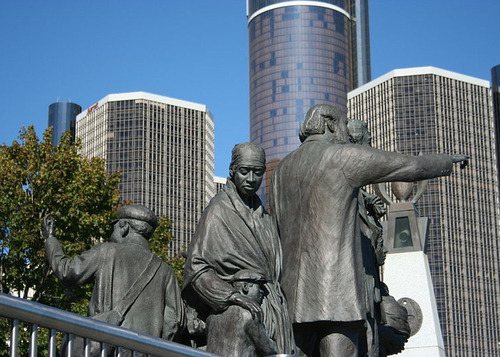
Metro Detroiters love to celebrate their local history, especially when it involves the noble, magnificent and world-class chapters of the past: The auto industry. Motown Records. The Underground Railroad. Diego Rivera. Coney Islands.
On the other hand, local history has its crazy uncles. Those are chapters that might be fascinating and important, but they are hidden in the back room and rarely talked about. Henry Ford’s anti-Semitism, taking land from the Indians, the Free Press’ 19th Century racism and the auto companies’ early abuse of workers come to mind.
Then there is the granddaddy of all forgotten local history. The subject no one talks about, virtually ever. The most neglected topic of all.
youtube
Slavery.
Slavery in Detroit has remained an enormous secret. It is an essential chapter in Detroit’s 311-year story, but it has been pushed back into archives and covered up by decades of neglect and denial. Few people, even well-informed college graduates, know that slavery played a key role in the growth of Detroit, and wealthy Detroiters owned slaves for the first 120 years of the city's existence.
When metro Detroiters talk about slavery, they talk about black men and women picking cotton in Georgia and Mississippi because that is what students in southeastern Michigan learn in school.
Yet slavery is very much homegrown. What has been called the “national sin” is also Detroit’s sin. It is the origin of our racial crisis, our peculiar institution, our “necessary evil.” Slavery belongs to Detroit just like slavery belongs to Charleston, Monticello and New Orleans.
Many roads, schools and communities across southeast Michigan carry the names of old, prominent families that owned slaves: Macomb, Campau; Beaubien; McDougall; Abbott; Brush; Cass; Hamtramck; Gouin; Meldrum; Dequindre; Beaufait; Groesbeck; Livernois and Rivard, among many others.
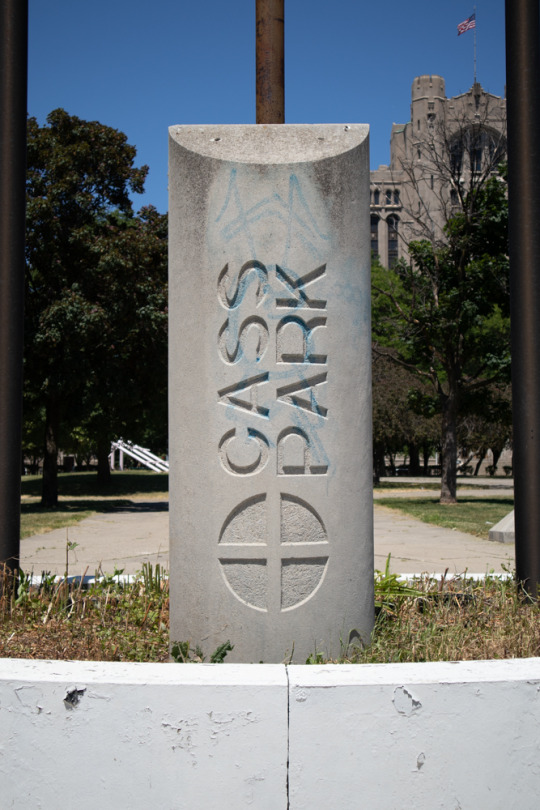
Detroit’s first mayor, John R. Williams, the namesake of two streets in Detroit – John R and Williams – owned slaves. The Catholic Church in Detroit was heavily involved in slavery – priests owned slaves and baptized them, and at least one slave worked on the construction of Ste. Anne’s Church around 1800. The men who funded the Free Press when it was founded in 1831 were ex-slave owners, and the paper supported slavery during the national debate before the Civil War.
The work of slaves helped build Detroit. And just like in the South, slavery in Detroit was reinforced by violence. Slaves worked without any pay for their entire lives, under threat of the lash and death.
Owners used their power over slaves to steal their labor and enrich themselves. Slaves arrived in Detroit stripped of their identity, culture, family and often their name. They were frequently maimed from torture.
Slaves died, often young, and were buried in graveyards that were soon forgotten, and then paved over by later generations of Detroiters, and their bones remain underfoot in America’s blackest big city, and their stories continue to be unknown in a region where race always has been a consuming issue.
Slavery was as much a part of early Detroit as the fur trade. Most residents who could afford slaves owned them during Detroit’s French, British and early American periods, from the city’s founding in 1701 to the second decade of the 19th Century. In 1750, for example, toward the end of the French regime, more than 25 percent of Detroit residents kept slaves.
“Not surprisingly, Detroit’s slaveholders came from the wealthiest segment of French society and produced a disproportionate amount of the village’s grain and livestock,” writes Brett Rushforth in “Bonds of Alliance,” a new book about slavery in Quebec and the Great lakes area in the 17th and 18th centuries.
Rushforth’s book touches upon the subject of slavery in Detroit, and in so doing he helps raise the veil on the city’s hidden history. Another academic, the University of Michigan’s Tiya Miles, has begun researching the subject, and earlier this year she told NPR’s Michel Martin that slavery “had a multilayered aspect in Detroit.”
There are almost no physical reminders of slavery left in Detroit. But one artifact that remains is a scarred and cracked account book that has yellowed and brittle pages. It sits in storage in the Burton Historical Collection at the Detroit Public Library. The book belonged to William Macomb, the richest person in Detroit when he died in 1796.
Macomb owned Grosse Ile and Belle Isle and several houses and page after page of livestock, tools and furniture. Macomb also owned people. Listed prominently near the front of the book along with things like shovel tongs, saddle bags and goats, are the names of, or references to, 26 human beings: Scipio, Tom, Guy, Charlie… Only one, Jim Girty, had a family name. Together, the slaves’ total value was listed as 1,655 pounds in New York currency.

In his will, Macomb wrote: “I give and bequeath to my loving wife, Mrs. Sarah Macomb, for her own use, all my moveable estate wheresoever…my slaves, cattle, household furniture, books, plates, linen, carriages and my utensils of husbandry.”
I examined that book last week, with a librarian and photographer. It is stark. We acknowledged that it felt strange to look at a simple page with lovely penmanship that represents a national horror involving so much human suffering.
Detroit’s history of slavery is complicated by the fact that African Americans were not the only people held in captivity. Native Americans were also enslaved here, especially during the early decades of the 18th Century when the French ran Detroit.
Indian slavery pre-dated the arrival of Europeans, and it was a very different system than the form of black slavery that Europeans brought to North America. Indians did not consider slaves property, and in native culture slaves possessed symbolic value, and were used as gifts during trade and negotiations, and to take the place of dead warriors.
Eventually, though, Indian slavery mixed with European slavery and produced a hybrid form of bondage that played a major role in relations among Indians and Europeans in Detroit throughout the 18th Century.
Slavery was important, for example, in the interaction between men and women. Traders in Detroit’s early days used female Indian slaves as backcountry wives, both for companionship and as a way to ingratiate themselves with the women’s relatives, which enhanced the traders’ ability to do business with the Indians.
During the British era, one of Detroit’s most successful traders was John Askin, who had three children with an Ottawa woman named Monette, a slave he owned and later freed. Askin was known for his aggressive business tactics, including plying Indians with alcohol. His papers, also preserved at the Burton Collection, show he bought and sold several native and black slaves during his career.
“Rum and sex paved the way for Askin’s success,” wrote historian E.A.S. Demers.
“Sexual violence permeated the slave experience” in the Great Lakes, wrote Rushforth. Many women, he added, like Monette, eventually rose to social acceptance and freedom, but not before a “prolonged submission to what could be defined as serial rape.”
Whether male or female, life was harsh for slaves on the Detroit frontier. They generally slept on the kitchen floors of Detroiters’ homes, and the record is clear that owners did not hesitate to flog their human property when they believed discipline was called for.
Yet in slavery's scale, Detroit was not South Carolina. Detroit’s simple trading economy, small population and modest farms did not require large numbers of slaves, and slaves in Detroit generally lived in closer proximity to their owners than slaves in the south.
Slaves never exceeded 10 percent of the population in Detroit; in the south before the Civil War, slaves made up 33 percent of the population. In Detroit, Macomb was the biggest slave owner, with a couple of dozen slaves; in Virginia, Thomas Jefferson owned some 600 slaves in his lifetime. Jorge Castellanos, a former professor at Marygrove College, once wrote that Detroit was not a “slave society,” but a “society with slaves.”
Forgetting
Grosse Ile, once owned by William Macomb, is the largest island in the Detroit River. Residents have done a lot to keep alive the community’s long history. But no one knew anything about the Macomb family owning slaves until Joel Thurtell, a Detroit Free Press reporter, brought it to their attention while he was doing a story in 2007.
Denise de Beausset, who is Macomb’s great-great-great-great-great granddaughter, told Thurtell: “No, I wasn’t aware of them having slaves at all. That’s funny; you’d think there would have been talk about slaves running the farm. Nobody ever talks about it on our side. I wonder if it was out of embarrassment or it wasn’t politically correct. Nobody ever talked about slaves. I’ll be darned.”
I have two friends whose roots in Detroit go back to the French period of the early 1700s. When I told them their ancestors had owned slaves, they thought I was joking. One friend, who had researched her family’s history, was flabbergasted when I broke the news.
“NO WAY!” she said. “Wow! Nobody told me anything about that, but I guess they wouldn’t. I am just embarrassed. That’s interesting. Fascinating.”
They are hardly alone in their obliviousness. Students of local history could research Detroit’s past for years before they would stumble across evidence of slavery. Since the early 1970s, slavery in Detroit has been the subject of research by a small number of scholars, who wrote academic articles that were mostly read by other academics and advanced students.
One graduate student, Arthur Kooker, wrote his doctoral dissertation in 1941 at the University of Michigan on abolitionists in Michigan before the Civil War. In his preface, Kooker wrote about his surprise when he discovered slavery itself had existed in Michigan.
“As the work progressed one fact that seemed to require an exploration kept bobbing up,” he wrote. “Rooted deep in Michigan’s past was the very institution which had called the antislavery movement into being.”
Remembering
During the first years of the 21st Century, many Americans discovered the story of slavery in the United States, especially as it existed outside the south. Prodded by activists and historians, a number of institutions and individuals acknowledged their historic ties to slavery and other extreme racist behavior, and in many cases asked for forgiveness.

A partial list of those performing a self-examination, and often issuing an apology or moving for reconciliation, includes President Bill Clinton (on behalf of the United States); Brown University; Yale University; Harvard University; Wilmington, N.C.; New York City; Philadelphia, Miss.; Duluth, Minn.; Birmingham, Ala.; London, England.; various insurance companies; the Southern Baptist Convention; the U. S. Senate; the Hartford Courant, the Raleigh News and Observer; the Lexington, Kentucky, Herald-Leader; J.P. Morgan Chase and several other banks.
Ira Berlin, one of the nation’s foremost historians of slavery, wrote in 2006 that “slavery has a greater presence than at any time since the end of the Civil War.”
Slowly, the curtain has begun to rise across the country on slavery and other forms of historical racism. Most notably, the collective amnesia is disappearing that allowed the north to absolve itself of involvement in slavery while castigating the south. People are realizing that understanding slavery is central to understanding the origins of America itself.
Detroit’s selective memory, however, has remained intact. Almost nothing has been done to seek out the truth about the role of slavery in Detroit’s history. And that seems unfortunate in a region where the theoretical underpinning of slavery – racism – remains a paramount issue.
It’s not a happy story. It’s probably not a coincidence that we celebrate the uplifting saga of the Detroit and the Underground Railroad rather than the tremendously sad story of Detroit and human captivity. For a nation – and city -- built on the notion of freedom, to consider the idea that slavery was also a major part of the foundation is difficult and disillusioning.
But telling the truth about our history can be a start on telling the truth about today.
“Slavery is the ground zero of race relations,” Berlin has written. “There is a general, if inchoate, understanding that any attempt to address the question of race in the present must also address slavery in the past.”
► Related: Detroit Landmarks And Roadways, And The Slave Owners They Were Named For
#Detroit#michigan#Slavery is Detroit's big#bad secret. Why don't we know anything about it#slavery in Detroit#slavery in michigan#northwest ordinance 1812#michigan territories#Youtube
15 notes
·
View notes
Note
Girl.... Imma need all the tea abt Michael's brothers being leaches.
I do remember that one of them said that there wouldn't be no Michael Jackson without Jackson 5. BFFR. omg.
Just look at Spotify monthly listeners. I tend to compare artists who debuted at the same time and if they are still alive or not.
Marlon Jackson: 945
Jackie Jackson: 1'180
Tito Jackson: 15'148
Jermaine Jackson: 771'648
The Jacksons: 2'862'021
The Jackson 5: 8'607'046
Michael Jackson: 43'067'506
I know Spotify listeners aren't everything in terms of success or talent. Just look how Selena Gomez supposedly has more than Beyonce. But here I mean the gap is huge.
And the fact they NEEDED him for the Victory Tour otherwise no one would have showed up.
...Anon, I'm gonna be honest here, I completely forgot Jermaine wasn't the only of MJ's brothers to try and have his own solo career. And it says a lot that even though he was the most sucessful of MJ's brothers, he was nowhere near as relevant as he wanted to be - let alone as relevant as Michael.
Also, I know that showbusiness is cruel, especially to child stars, and the music industry is super unfair and buries really talented artists while promoting others that are not even good - but lets not kid ourselves here.
Like you said, the very fact that they had to drag him into that tour to make it relevant already says a lot - but there's even more to that. Michael decided, on his own, that this was going to be the LAST tour, and announced it at the last concert, without discussing it with anyone. He didn't just quit, he essentially ended the group.
They tried to carry on without him a few years later, and it went nowhere because nobody cared about them if Michael wasn't there. Meanwhile, he had random dancers/back-up singers stand in for his brothers whenever he'd ocasionally perform "his" old songs, and nobody except their mom ever complained. I strongly suspect some people didn't even notice - first time I watched some of the performances of the Bad Era, I sure didn't.
They had a reunion in 2001 - in some concerts to celebrate MICHAEL's career, with a moment dedicated to some Jackson 5/the Jackson's hits. They tried for a reunion and their own TV show in 2009 - the same time Michael's final tour was supposed to happen. When Michael died, all the interest in the projects of his brother's died too, with their proper reunion only happening a few years later... in a tribute to Michael.
But by far the biggest evidence that Michael didn't need them was Motown 25. He performed with his brothers, and even though he was obviously the star, they were still great, truly fucking awesome, you can clearly tell they are all giving it all their talent and energy.
Then he performed Billie Jean and did the moonwalk without a breaking a sweat and it was like his brothers never existed. Their big moment was Michael's warm up, and his big moment had him on stage by himself, singing the biggest hit of his SOLO career, overshadowing everything that came before it.
The only one of his siblings that ever managed to not be in his shadow was Janet. And even then, despite being HUGE, she was not KING OF POP huge. Probably because literally nobody else, before or since, could do what Michael did.
For fuck's sake, look at "We Are The World." Pretty much every famous singer of the decade was there, every single one of them giving it their all - and Michael is still clearly the star, because he wasn't just better than his siblings, he was better than everybody.
And I think that's the reason why his brothers never fully let go of all their envy. Pretty much everyone in that family exploited Michael for his money/relevance, but since his brothers were once his bandmates, they felt full on entitled towards not just Michael's money, but his career in general - because their time as a band was the most sucess they were ever gonna achieve, but it was quickly becoming just "Michael Jackson's early years, when he was not as famous as he is right now, but was already way more famous than his brothers will ever be." They were dependent on him, and were now being told "No, he won't let you all tag along forever."
Hence them demanding to be part of "Off The Wall" and getting mad when Michael didn't let them, making him tour with them singing the band's biggest hits instead of doing a tour for Thriller, fucking raiding his house for valluable stuff, using his money to buy mansions for themselves and raise their kids/pay child support, claiming that if things had been just slightly different their own solo careers totally could have been just as big as Michael's, etc.
It wasn't just that their sibling slowly became way better than them and eventually didn't need them to be sucessful. Michael NEVER needed them. He was always the star, the one people were more interested in, the one with the most talent, and eventually he realized that, if he continued letting his family pressure him into ignoring his own goals and focused on "paying his debt to his siblings (and father)" he was at best going to be held back forever so his brother's could stay relevant at his expense, and at worst he'd ruin his own career completely just so they could all fail together and his brother's egos would be spared.
Again, see how HE basically ended the band (or at least the version the public actually cared about). To them, it wasn't Michael going solo, it was him kicking them out. Like they would have TOTALLY made Thriller with him, or could have each done it on their own. Like his solo works are theirs by extention just because they used to do things as a group, and therefore they deserve the profit and the credit for something they were not involved in.
Joseph, of course, did not fucking help make the situation any better. I already mentioned all the physical abuse he put his children through during reharsals, but there's one more thing: he'd sometimes deliberately compare his other sons to Michael when they made a mistake while dancing or singing, to make them feel worse about themselves for not being as good as their brother. OBVIOUSLY that led to a ton of misplaced resentment towards their sibling for them, and to Michael feeling guilty about something that wasn't his fault.
Joseph is also the person who taught them their very warped idea of "family." He had always said that family was the most important thing in the world - because he was one of these parents who believed that, since he was responsible for them being alive, they owed him literally EVERYTHING and thus had to put up with EVERYTHING.
He wanted to beat them with a belt whenever they did anything wrong? They should just shut up and endure it, it's just discipline, and they wouldn't be going through that if they could just do what they're told.
He wants to control their careers, have "his share" of their money, and then use said money to cheat on their mother? Doesn't matter, he is still the man of the house if he's not the one making the money, and thus they owe him respect and shouldn't meddle on what he does with his life.
Michael is clearly depressed about all the trauma he was put through and the childhood that was stolen from him? Oh please, he should be thankful that he was made to work like a dog for most of his life, it's the thing that has allowed the whole family to live not just comfortably, but luxuriously - with his money. That he totally only made because of Joseph, so they really don't owe anything to Michael.
It's really no surprise that, after being raised by that man, Michael's brothers turned out the way they did. Their complaints were "God, he told me to buy a smaller house since I can't afford a mansion instead of buying said mansion for me, the watch he gave me for my birthday is only worth ONE million dollars instead of two, and he will only let us do a medley of our Jackson 5 hits during his show, not tour with us again, how selfish!" meanwhile Michael was complaining that since everyone, including his own family, was only ever thinking of how being close to him would benefit their image/lead to them making money, he was incredibly lonely and miserable.
Nine times out of ten, Michael helped his family out of "obligation" - because that's what they turned their relationship into. A transaction, a contract. Michael "paying his debt" to people that cared about his money and fame so much that they often forgot he was a person that, even after all they did, STILL loved them.
But I guess "We are totally responsible for his sucess, and in fact could have totally been just as famous" is a much more pleasant version of the story than "We completely failed our brother, and we should thank God everyday that he never fully broke free of this AWFUL family, because otherwise we'd be broke and even more irrelevant."
23 notes
·
View notes
Text

Stevland Hardaway Morris known professionally as Stevie Wonder, is an American singer-songwriter, musician, and record producer. He is credited as a pioneer and influence by musicians across a range of genres that include R&B, pop, soul, gospel, funk, and jazz. A virtual one-man band, Wonder's use of synthesizers and other electronic musical instruments during the 1970s reshaped the conventions of contemporary R&B. He also helped drive such genres into the album era, crafting his LPs as cohesive and consistent, in addition to socially conscious statements with complex compositions. Blind since shortly after his birth, Wonder was a child prodigy who signed with Motown's Tamla label at the age of 11, where he was given the professional name Little Stevie Wonder.
Wonder is one of the best-selling music artists of all time, with sales of over 100 million records worldwide. He has won 25 Grammy Awards (the most by a solo artist) and one Academy Award (Best Original Song, for the 1984 film The Woman in Red). Wonder has been inducted into the Rhythm and Blues Music Hall of Fame, Rock and Roll Hall of Fame and Songwriters Hall of Fame. He is also noted for his work as an activist for political causes, including his 1980 campaign to make Martin Luther King Jr.'s birthday a federal holiday in the U.S. In 2009, he was named a United Nations Messenger of Peace, and in 2014, he was honored with the Presidential Medal of Freedom.
25 notes
·
View notes
Text


Today's compilation:
25 #1 Hits From 25 Years
1983
R&B / Soul / Girl Groups / Pop-Soul / Disco
Seriously, it's so wild to me that just three years before Motown put out this double-LP that took 25 of their #1 hits from a 25-year period, they released another compilation with the same concept that took 20 #1 hits from a 20-year period; and almost half the tunes between these two releases don't actually overlap at all! To put this in perspective, I don't think there's another record company in America, outside of enormous major labels that have been around for many more decades and have released music across a much broader spectrum of genres, that could put together even one volume of US chart-toppers. But if a single volume consists of roughly 20 to 25 songs, then Motown would need to put out a total of two volumes and change in order to cover every #1 hit that they've ever had! They're just so head-and-shoulders above everyone else.
And while the 20-songs-in-20-years comp put a lot of its focus on the 70s, this one operates chronologically, and starts in 1961 with Motown's first ever #1, the super catchy girl group classic, "Please Mr. Postman," by The Marvelettes. It doesn't then go on to provide every single #1 from the 60s from there, but the album still spends a little less than a third of its tracklist within that decade, which was a critically important part of Motown's history that the prior compilation really seemed to gloss over.
So, again, no obscurities here whatsoever on this thing, but I think this is the most definitive document of Motown's greatest hits that I've ever come across. And if you want even more #1s, you can take this one in tandem with 20/20: Twenty #1 Hits From Twenty Years at Motown too 😊.
Highlights:
The Marvelettes - "Please Mr. Postman"
The Supremes - "Baby Love"
The Temptations - "My Girl"
The Four Tops - "I Can't Help Myself (Sugar Pie, Honey Bunch)"
Diana Ross & The Supremes - "You Can't Hurry Love"
The Four Tops - "Reach Out (I'll Be There)"
Marvin Gaye - "I Heard It Through the Grapevine"
The Jackson 5 - "I Want You Back"
The Jackson 5 - "ABC"
Diana Ross - "Ain't No Mountain High Enough"
The Jackson 5 - "I'll Be There"
Smokey Robinson & the Miracles - "Tears of a Clown"
The Temptations - "Just My Imagination"
Marvin Gaye - "What's Going On"
Thelma Houston - "Don't Leave Me This Way"
Marvin Gaye - "Got to Give It Up (Part 1)"
The Temptations - "Papa Was a Rolling Stone"
Eddie Kendricks - "Keep On Truckin'"
Stevie Wonder - "Superstition"
Rick James - "Give It To Me Baby"
Stevie Wonder - "You Are the Sunshine of My Life"
Marvin Gaye - "Let's Get It On"
#r&b#r & b#r and b#soul#soul music#girl groups#pop soul#soul pop#pop#disco#dance#dance music#oldies#music#60s#60s music#60's#60's music#classic pop#70s#70s music#70's#70's music#80s#80s music#80's#80's music
10 notes
·
View notes
Text
gothcleats as songs from each of the taylor swift (yes that one) album
im so sick in the head about them and i haven’t made a post about them in a while so here ya go
DEBUT-Our Song
starting out with a soft silly one first, also scarys a musician so this makes sense 😽
lyrics: “Our song is the slamming screen door
Sneakin' out late, tapping on your window
When we're on the phone, and you talk real slow
'Cause it's late, and your mama don't know
Our song is the way you laugh
The first date, "Man, I didn't kiss her, and I should have"”
FEARLESS- The Way I Loved You
i know this song is about missing an ex and all, but in the context of gothcleats i want to interpret it like gothcleats in the “betrayal arc”
lyrics: “But I miss screaming and fighting and kissing in the rain
And it's 2 a.m. and I'm cursing your name
So in love that you act insane
And that's the way I loved you”
SPEAK NOW- The Story of Us
imo this is one of the most gothcleats songs of all time, again during the “betrayal arc” and it gives very big “enemies closer” vibes with being so close to each other but not knowing what to say. it’s also very much scarys POV
lyrics: “Oh, I'm scared to see the ending
Why are we pretending this is nothing?
I'd tell you I miss you but I don't know how
I've never heard silence quite this loud
Now I'm standing alone in a crowded room
And we're not speaking and I'm dying to know
Is it killing you like it's killing me? Yeah
I don't know what to say since the twist of fate
When it all broke down
And the story of us looks a lot like a tragedy now”
RED- I Almost Do
ep 25 core and also after the betrayal el oh el
lyrics: “I bet
You think I either moved on or hate you
'Cause each time you reach out there's no reply
I bet
It never ever occurred to you
That I can't say "Hello" to you
And risk another goodbye
And I just wanna tell you
It takes everything in me not to call you
And I wish I could run to you
And I hope you know that every time I don't
I almost do
I almost do
Oh, we made quite a mess, babe
It's probably better off this way
And I confess, babe
In my dreams you're touching my face
And asking me if I wanna try again with you
And I almost do”
1989-Out Of The Woods
this song is being able to make it through something difficult together, which is what gothcleats had been doing this entire fucking time, they just want to be out of the woods
lyrics: “Looking at it now
Last December
(Last December)
We were built to fall apart
Then fall back together
(Back together)
Ooh, your necklace hanging from my neck
The night we couldn't quite forget
When we decided, we decided
To move the furniture so we could dance
Baby, like we stood a chance
Two paper airplanes flying, flying, flying
And I remember thinking
Are we out of the woods yet?”
AND
“Remember when you hit the brakes too soon?
Twenty stitches in a hospital room
When you started crying, baby, I did too
But when the sun came up, I was looking at you
Remember when we couldn't take the heat?
I walked out, I said "I'm setting you free"
But the monsters turned out to be just trees
When the sun came up you were looking at me”
(also “looking at it now/ last december/ we were built to fall apart/ and fall back together” december is i’m pretty sure around when ep 31 with the fireball/ “you can try to kill me but i wont hurt you” scenario would fall timeline wise)
REPUTATION- King Of My Heart
there’s not much reason to this song other than just the vibe reminds me of them and they deserve to be happy 🫶
lyrics: “Salute to me, I'm your American Queen
And you move to me like I'm a Motown beat
And we rule the kingdom inside my room
'Cause all the boys and their expensive cars
With their Range Rovers and their Jaguars
Never took me quite where you do
And all at once, you are the one I have been waiting for
King of my heart, body and soul, ooh whoa”
AND
“Is this the end of all the endings?
My broken bones are mending
With all these nights we're spending
Up on the roof with a school girl crush
Drinking beer out of plastic cups
Say you fancy me, not fancy stuff
Baby, all at once, this is enough”
(honestly another good choice for this would’ve been dress and it might’ve fit better but I LOVE KOMH OKAY)
LOVER-The Archer
while a lot of the songs in lover are very soft and nice, and gothcleats well, isnt, The Archer i think shows scarys hesitancy to become close to link and the other teens, because people have left her continuously in the past. she doesn’t believe people should want to stay with her.
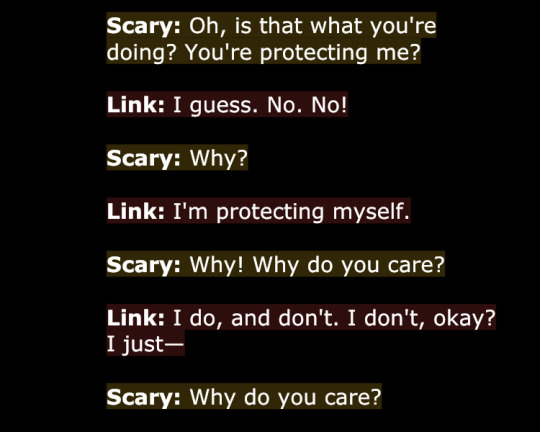
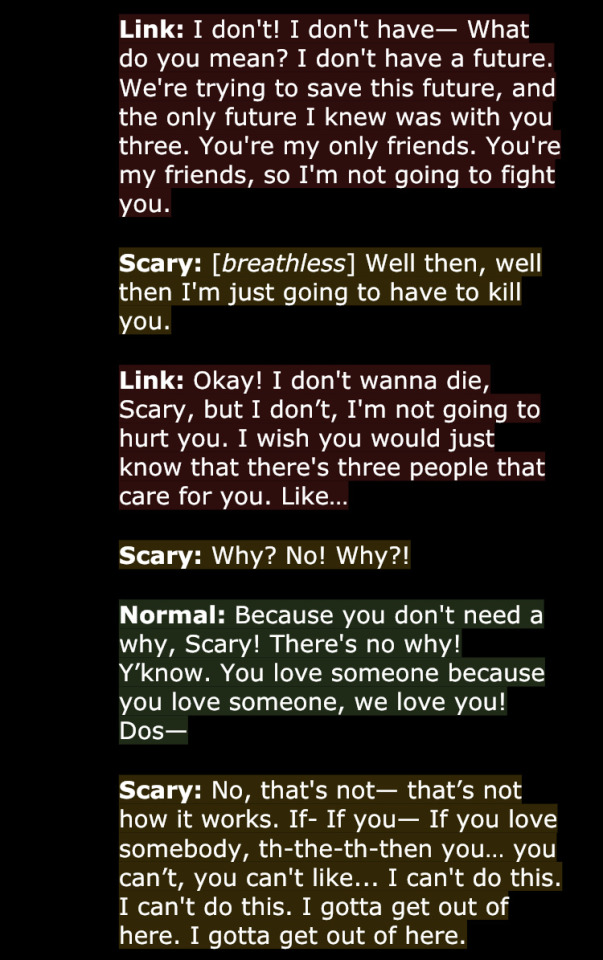
lyrics: “I've been the archer
I've been the prey
Screaming, who could ever leave me, darling?
But who could stay?
(I see right through me, I see right through me)
'Cause they see right through me
They see right through me
They see right through
Can you see right through me?
They see right through
They see right through me
I see right through me
I see right through me
All the king's horses, all the king's men
Couldn't put me together again
'Cause all of my enemies started out friends
Help me hold onto you”
FOLKLORE- exile
link defended scary for a lot of the things she did, despite her telling and proving to him that he shouldn’t have, he did. this song to me is directly after the death of tony pepperoni and realizing what she’s left him with.
lyrics: “And it took you five whole minutes
To pack us up and leave me with it
Holdin' all this love out here in the hall
I think I've seen this film before
And I didn't like the ending
You're not my homeland anymore
So what am I defending now?
You were my town
Now I'm in exile, seein' you out
I think I've seen this film before”
AND
“I can see you starin', honey
Like he's just your understudy
Like you'd get your knuckles bloody for me
Second, third, and hundredth chances
Balancin' on breaking branches
Those eyes add insult to injury”
EVERMORE- right where you left me
wow gothcleats angst goes hard in evermore and folklore. this song shows the moment frozen in time of either link saying “get the fuck out of my house scary”
lyrics: “Help, I'm still at the restaurant
Still sitting in a corner I haunt
Cross-legged in the dim light
They say, "What a sad sight"
I, I swear you could hear a hair pin drop
Right when I felt the moment stop
Glass shattered on the white cloth
Everybody moved on
I, I stayed there
Dust collected on my pinned-up hair
They expected me to find somewhere
Some perspective, but I sat and stared”
AND
“Did you ever hear about the girl who got frozen?
Time went on for everybody else, she won't know it
She's still 23 inside her fantasy
How it was supposed to be
Did you hear about the girl who lives in delusion?
Break-ups happen every day, you don't have to lose it
She's still 23 inside her fantasy
And you're sitting in front of me”
MIDNIGHTS- Midnight Rain
something something scary growing up with a general lack of love in her life while link has felt nothing but something something
lyrics: “My boy was a montage
A slow-motion, love potion
Jumping off things in the ocean
I broke his heart 'cause he was nice
He was sunshine, I was midnight rain
He wanted it comfortable
I wanted that pain
He wanted a bride
I was making my own name
Chasing that fame
He stayed the same
All of me changed like midnight”
honorable mentions!
-dress
-back to december
-you belong with me
-the lucky one (hear me ou-)
in conclusion, i love them and taylor swift, thank you and goodnight
#dndads#dungeons and daddies#honestly#if my friends hadn’t found my acc before they will deffo find it bc of this#gothcleats#lincoln li wilson#scary marlowe#taylor swift was thinking of gothcleats when she wrote “now i’m standing alone in a crowded room and we’re not speaking”#taylor swift#taylor swift (yes that one)#i love them#they are everything to me
12 notes
·
View notes
